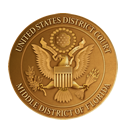(a) DISCIPLINE BY THE COURT. In addition to a judge's sanction or use of another grievance mechanism, the court can — after a hearing and for good cause — disbar, suspend, reprimand, or otherwise discipline a member of the Middle District bar or a lawyer appearing by special admission.
(b) REQUIREMENT TO REPORT AND AUTOMATIC SUSPENSION.
(1) Requirement to Report. A lawyer must inform the clerk within fourteen days after the lawyer is convicted of a felony or loses good standing with, is publicly disciplined by, is disbarred on consent from, or has resigned from, any bar.
(2) Automatic Suspension. Twenty-one days after an event listed in (b)(1), a lawyer is automatically suspended. But automatic suspension under this rule is stayed if, before the automatic suspension, the lawyer petitions the chief judge for relief. If the lawyer is a member of the Middle District bar, the chief judge or one or more judges designated by the chief judge determines the petition. If the lawyer appeared by special admission, the chief judge or the judge assigned to the action determines the petition. If an automatic suspension results from a bar's suspending the lawyer for ninety days or less, the lawyer’s reinstatement is automatic upon reinstatement by the bar.
(c) GRIEVANCE COMMITTEES.
(1) Requirement. Each division must maintain a committee to investigate alleged lawyer misconduct and report to the chief judge a recommended resolution of the allegation.
(2) Appointment and Composition. With the advice and consent of the district judges residing in the division or assigned a material caseload in the division, the chief judge must appoint the committee and designate the chair. The committee must consist of at least five lawyers, each appointed for no more than three years.
(3) Chair. The chair must ensure that an investigation and deliberation of the committee remains orderly, reliable, and reasonably speedy and offers fairness and due process to the accused lawyer and any alleged victim.
(4) Procedure.
(A) A judge or a committee member can initiate an investigation of alleged lawyer misconduct. A referring committee member must not participate further in investigating or recommending the resolution of an allegation of misconduct.
(B) The chair must appoint at least one committee member to preliminarily investigate the alleged misconduct, although the committee can elect to conduct the preliminary
investigation. The investigating member or members must prepare a preliminary report for the committee.
(C) Upon receiving the preliminary report, the committee must determine whether:
(i) to terminate the investigation because the allegation is unsupported or insubstantial or
(ii) to investigate further or refer the allegation to The Florida Bar or both.
(D) If the committee determines to terminate the investigation, the chair must report the determination to the referring judge or committee member.
(E) If the referring judge directs the committee to investigate further, the committee must investigate promptly and report to the judge whether probable cause exists to
believe that the lawyer is guilty of unprofessional or unethical conduct justifying disciplinary action.
(F) If the committee finds probable cause for disciplinary action, the chief judge or one or more judges designated by the chief judge:
(i) must order the lawyer to respond,
(ii) must determine whether clear and convincing evidence establishes lawyer misconduct, and
(iii) if so, must impose a proportionate sanction.
(G) The chief judge must notify each district and magistrate judge and the clerk of the sanction imposed.
(5) Notice. Unless the committee finds probable cause, a lawyer has no right to notice of the investigation.
(6) Cooperation. A lawyer must respond to, and fully cooperate with, the committee during an investigation.
